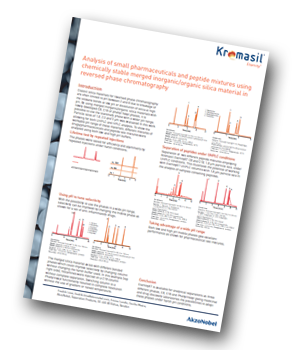Kromasil has produced an application note demonstrating how, by using merged inorganic/organic silica materials with newly developed C8, C18 or phenyl hexyl phases, it is possible to use a stationary phase with a wider pH range.
 Introduction
Introduction
Classic silica materials for reversed phase chromatography are often limited to pH between 2 and 8 due to breakage of the siloxane bonds at low pH or dissolution of silica at high pH. In this work particle sizes of 1.8, 2.5 and 5 μm were evaluated allowing for both UHPLC and HPLC analysis. To show the workable pH range of these materials, different mixtures of drugs/pharmaceuticals and peptide test mixtures were analysed using both low and high pH buffers.
Using pH to tune selectivity
With the possibility to use the phases in a wide pH range, selectivity can be improved by changing the mobile phase. In this application note, an example is shown for a set of anti-inflammatory drugs.
The merged silica material exists with different bonded phases that could improve selectivity by changing column without changing the harsh buffer used. In this example, histamines were injected on a C18 column without complete separation. Switching the column to a PhenylHexyl functionality resulted in complete resolution
without the use of gradient or raised temperature.
Separation of peptides under UHPLC conditions
In this application, separation of two different peptide mixtures employing Kromasil EternityXT C8 and C18, 1.8 μm particle size, under UHPLC conditions took place. The potential of working with EternityXT UHPLC columns with 1.8 μm particle size in the analysis of samples containing peptides is demonstrated.
Maximizing a wide pH range
Both low and high pH mobile phases are shown to give excellent performance in the example for pharmaceutical test mixtures.
Conclusion
EternityXT is available for analytical separations as three different phases, C8, C18 and PhenylHexyl giving medicinal and drug discovery laboratories the possibilities to adopt these phases under harsh pH conditions.




